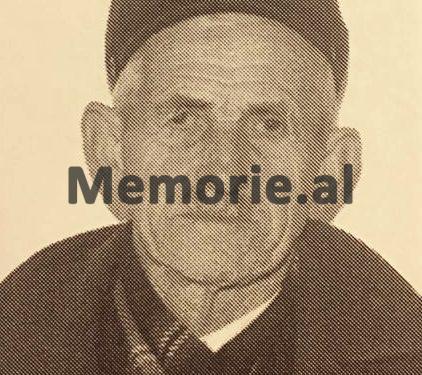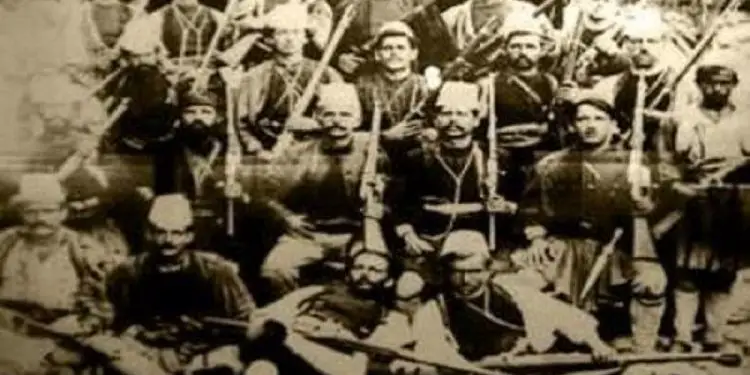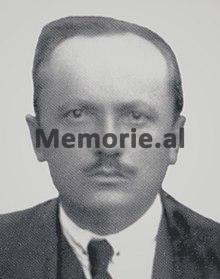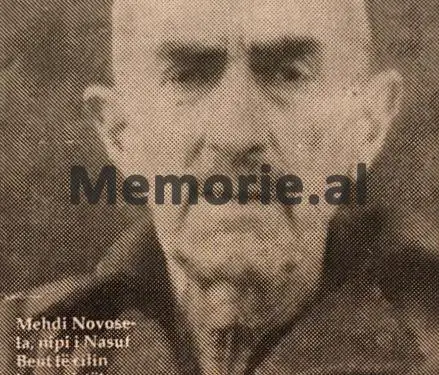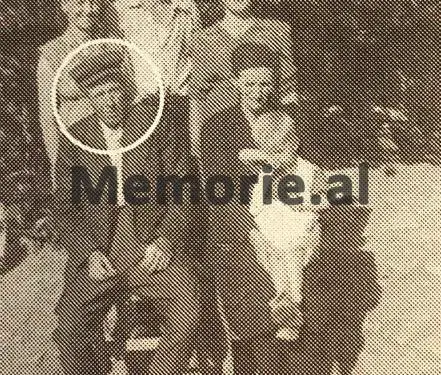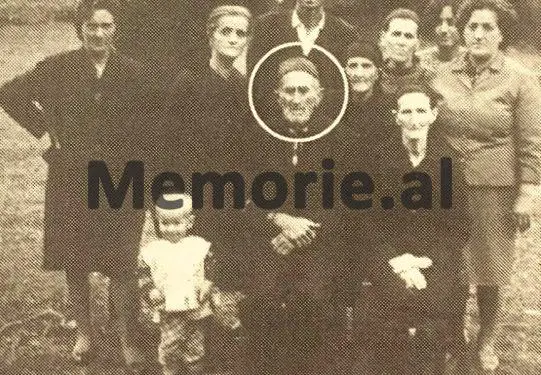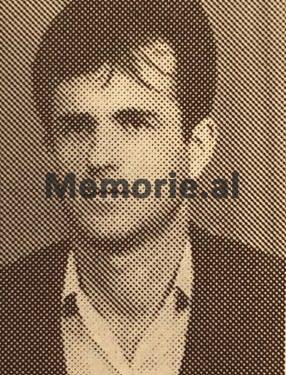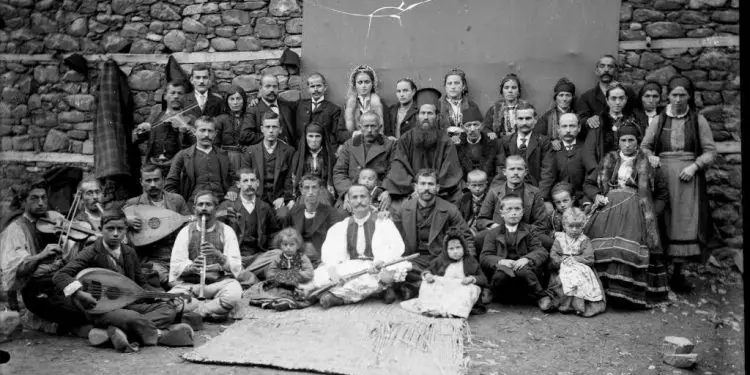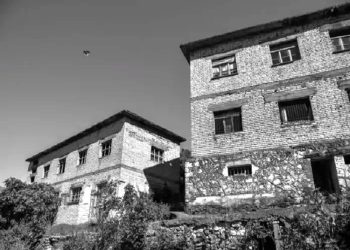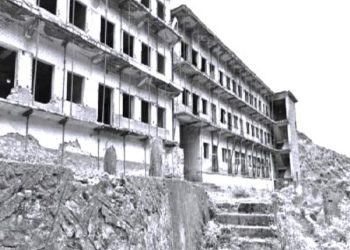Dashnor Kaloçi
Memorie.al publishes the unknown story of Nasuf Bey Novosella, the suckling of one of the richest families in Kolonje and the entire South of Albania, who after graduating from the Faculty of Law in Istanbul, was appointed by the High Gate to the post of Mytesarif. of Kolonjë, where he served for 30 years and during that time, after the telegram sent to him by Abdyl Frashëri, he helped Petro Nini Luarasi to open Albanian schools, and protected him from the people of the Greek Church who followed him and sought him for to kill him, an event which has been traversed by the well-known writer and politician, Sabri Godo, in his book, “The Elder of Butka”. Graduation in Istanbul for Political Science by his son, Hysen, who had taken private lessons with teachers from France, and his appointment as Kajmekam of the city of Bitola, where he married and never returned to Kolonje until he passed away… Memoirs of Sejfi Vllamasi, published in his book, “Political confrontations in Albania”, where he talks about Nasuf Bey, as one of the main people who organized the meeting in Frashëri Teke, where the Memorandum sent by Abdyl Frashëri was signed. Bismarck, the German Foreign Minister. The death of Nasuf Bej Novosela in 1908, where he was buried with great honors by thousands of people, as well as the persecution of his family by the partisans who burned down his house, having all the people inside and the miserable condition of that family during the period. of the communist regime of Enver Hoxha, where after all their property was seized and they were declared “kulak and enemies of the people”, they suffered for a living, keeping the village with alms.
“Nasuf Bey Novosela, who was my father’s uncle after he was educated in a Muslim religious school in Florina, Greece, where his father, Murati, worked, then continued his studies in the capital of the Ottoman Empire and in 1864, he graduated. excellently at the Faculty of Law of Istanbul. After graduating, he did not accept the offer to work in the Turkish high administration, where his appointment was prepared, but returned to his hometown, in the village of Novoselë, where the High Gate appointed him as a judge in the sub-prefecture of Kolonjë. Later, Nasuf Bey Novosela was appointed to the post of Mytesarif of Kolonje, which he ruled for 30 years, from 1873 to 1903. During that long 30-year period, when Nasuf Bey Novosela was the number one personality of the whole of Kolonje, he made great efforts and with his authority intervened until Istanbul, so that the High Gate would allow the opening of the first Albanian schools, which became possible after the help he gave to the colonial teacher, Petro Nini Luarasi, whom Nasufi loved as his son and always carried behind him, protecting him from the Greeks who followed him to kill him. After 1944, when the communists came to power, our family Novosela was declared reactionary and called us “kulaks and enemies of the people” and as a result, they burned down our three-story house with 22 rooms, and then confiscated all our property. which stretched in the middle of the town of Erseka, with all the estates we had in some villages of Kolonjë ”.
This is how he remembered the beginning of the persecution of their family, Siri Novosela (Duke), the grandson of Nasuf Bey Novosella, who tells the whole story of his grandfather, Nasuf Bey, who after studying law at Istanbul University, for thirty years, ruled Kolonje as its Mytesarif. But who was Nasuf Bey Novosela, what was the origin of his family, and where did her ancestors study? What was the wealth of the Novosela family, how were they enriched and how far were the estates of that family that was considered one of the richest in Kolonja? How did the conflict between Nasuf Bey and Dalan Bey Qafzezi start and why did they continue so much during the contradictions between them, which had to do with the opening of the first Albanian schools in Kolonjë? What was the activity of Nasuf Bey Novoselë that made possible the opening of the first Albanian schools in Kolonjë and how did he protect the teacher Petro Nini Luarasi from the Greeks who followed him to kill him? Why did Nasuf Bey order the assassination of the deputy prefect of Kolonja and how did he raise the Erseka people in protest after Valiu’s arrival from Bitola? Why did the partisans of the “Revenge” Battalion burn down the house of Nasuf Bey Novoselë and why did their commander demand that his nephew, the Mahdi, be tied up and pulled behind his horse to humiliate him in front of the village? How did the Novosela family, which was the richest in Kolonje, survive with the alms given to them by the village and Ali Vllamasi, who kept them in his mill? Regarding these and other events in the history of the Novosela family, Siriu (one of Nasuf Beut’s nephews) confesses that during the entire period of the communist regime, he suffered the most from the revenge of power, for the only reason that his grandfather had been the first of Kolonje.
The Novosela family, the richest in Kolonje
Nasuf Bey Novosela was born in 1842 in the village of Novoselë in Kolonjë, at the foot of Mount Radom, in the south-east of the town of Erseka, and the first members of that family have lived there for hundreds of years. Regarding the origin of this family and Nasuf Bey, her suckling son who made a great name, his nephew, Siri Novosela (Duke) testified: “It is not known exactly when our ancestors settled in that village, but Nasufi, who was my father’s uncle, telling me that our family had lived there for a long time. Nasuf’s father was called Murat and Murat’s father was called Diko Novosela, and from what I have heard from my ancestors, he studied at the Istanbul Military Academy. His son, Murat, who was Nasuf’s father, had not attended any school, so he worked as a security guard in Florina, Greece, because at that time the Novosela family did not have much wealth. Nasuf had another brother, Abdurrahman, who was a few years younger than him. During Murat Novosela’s time in Greece, he took his son Nasuf, who was educated at one of the Muslim religious schools in Florina, and after graduating from that school, Murati sent Nasuf to Istanbul, enrolling him in the Faculty. of Justice of that city, where he graduated with honors in 1864. After completing his studies, Nasuf was told to stay in Istanbul and work in the high administration of the Ottoman government, but he did not accept their offer. and decided to return to his native village in Novoselë. During the period that Nasufi was studying in Turkey, he took his brother Abdurrahman with him, who was educated in a madrasa in Istanbul, and after finishing it he returned to our village of Novoselë, where he served for many years in the village mosque. si Mulla. Abdurrahman had four children: Galip, who graduated in Istanbul with a degree in law, Mahdi, who is my father, who graduated from Ruzhdie school and then served as an imam in the village mosque, Fadil, who did not attend any school, and his daughter Haxhiren, and which dealt only with household chores. After Nasuf graduated from Istanbul and returned to the village, he received the news from the High Gate, which had appointed him to work as a judge in the Erseka Courthouse, which was then the center of the Kolonja sub-prefecture. After coming from Turkey, Nasufi got married and he had only one son named Hysen. For his schooling, Nasufi paid a private tutor from France, who taught Hyseni French at home and other school lessons. Nasufi then sent Hyseni to study in Turkey, and after graduating from Istanbul University with a degree in Political Science, the High Gate appointed him deputy prefect of the town of Manastir. Hysen Bej Novosela during those years who worked as deputy prefect of Bitola, married the daughter of Riza Bey Manastir and never returned to his village Novoselë, but worked there until his death “, recalled Siri Novosela, on the origin of the first his family who was educated in Turkey and his grandfather Nasuf Beun who graduated from the Faculty of Law in Istanbul.
Nasufi, Mytesarif of Kolonje
Regarding the enrichment of Nasuf Bey Novosella’s family and the extent of the family’s estates, Siriu said: “When Nasuf Bey came from Turkey and was appointed a judge in the Erseka Court, he was strongly supported by the Maluka family, which was the family at the time. Erseka’s richest man and her first, Rustem Maluka, kept her close to Nasuf and helped her with everything. The Malukals loved Nasuf so much that he called him Rustem Bey as the son of the house, and then he donated parts of his family’s property and possessions to several large estates. From the properties donated by the Malukallars to Nasuf, he acquired the right of ownership, becoming the owner of several estates that stretched in the villages of Shanovë of Korça where Nasufi became a partner with Alo Dishnica, as well as those in the villages of Kagjinaas and Sanjollas of Kolonjë, without mentioning the ones she had in the village of Novosel. Nasuf Bey had agreed on the administration of this large fortune and the estates he had in the villages, such as Tefik Ajazi, Hodo Kreshova, etc., which I do not remember, who took care of their administration. During that time, in addition to the great friendship that Nasuf Bey had with the Malukallars, who helped him by making him quite rich, he had a close friendship and was also supported by Mustafa Pasha Taçi, who had graduated from the Military Academy in Istanbul and from the wars he had fought at the Five Wells in Ioannina, he held the rank of the retired general. Nasuf Bey also had close friendships with the great patriot Sali Butka, with whose family they had been linked three times by marriage, as well as with several other families of beys, such as Mehmet Bey Helmein, etc., who respected him greatly. it. After Nasuf Bey was economically empowered and by the great authority he enjoyed, both in the people of Kolonje and in the administration of Istanbul, the High Gate named him Mytesarif (deputy prefect) of Kolonje, who at that time depended on the Prefecture of Korça, ”he recalled. Siri Novosela, regarding the appointment of Nasuf Bey as Mytesarif of Kolonja and how he was enriched by the Malukallars who at that time were the richest family of Erseka.
Enmity with Dalan Bey Qafzezi
How did the events unfold for Nasuf Bey Novosela after he was appointed Mytesarif of Kolonja? In this regard, Sirius stated: “The election of Nasuf Bey as Colonel’s Mytesarif, at that time aroused the jealousy and resentment of some other Turkic-speaking beys, who had their intentions to govern Kolonje. Thus, one of them was Dalan Bey Qafzezi, whose family at that time was among the first of the colonial beys. One of the main reasons that further fueled the contradictions and animosity between Nasuf Bey Novoselë and Dalan Bey Qafzezi, was that Dalan Bey, at that time, was becoming a major obstacle to the opening of the Albanian school in Kolonjë, which he did since he was a pilot and to serve the Ottoman government, in his intentions to come to power in Kolonje. Although these contradictions between them were greatly aggravated, Nasuf Bey had the strongest positions, not only because he was the Mytesarif of Kolonje, but in his work, he also enjoyed an undisputed authority both among the people and at the High Gate in Istanbul, which respected him as an honest and correct administrator. Based on this, Dalan Bey Qafzezi, by paying his people to Turkey, managed to bring a commission from Istanbul to Kolonje to control the work of Nasuf Bey in order to dismiss him from the position of Mytesarif. The Turkish High Administration Commission was placed in the offices of the Erseka sub-prefecture and for two days began to check the administration documents of that sub-prefecture, in order to report to Istanbul on the poor performance of Mytesarif, Nasuf Bey Novosel. The arrival of that commission from Turkey at that time was heard in almost the entire sub-prefecture, where the word was spread that Nasuf Bey would be dismissed. At that time, Mustafa Pash Taçi, a retired general who was ill in bed in his village at the time, also heard these words. He loved Nasuf Bey so much that, as he was ill, he got up, put on the general’s clothes in all ranks, and went to Erseka to meet the Commission that had come there. Mustafa Pasha met them and put pressure on them, telling them that if they intervened to oust Nasuf Bey, he would go to Istanbul to the Sultan and protest that they were defending Dalan Bey. , who was a thief and a murderer. After the intervention of Mustafa Pasha, the commission of the Turkish administration could not dismiss Nasuf Bey, although at that time Dalan Bey Qafzezi was supported by the Turkish deputy prefect of Kolonja. After the Turkish commission returned to Istanbul, Nasuf Bey, in order to take revenge on the Turkish deputy prefect, who unjustly defended Dalan bey Qafzezi, organized the murder of the deputy prefect, charging that work to Nexhip Gostnishti.
The assassination of the Turkish deputy prefect
But how did the murder of the Turkish deputy prefect of Kolonja happen and how did the events unfold afterward? In this regard, Sirius stated: “According to the order that Nasuf Bey gave to his man, Nexhip Gostivar, he carried it out by stabbing him to death in the Turkish prefect, a murder which he carried out in secret so that it would not be revealed that he was its author. After the murder which caused a great commotion up to Istanbul, the High Gate charged the Governor of the Monastery to come to Kolonje and discover and punish the assassins of the deputy prefect. After the Turkish governor of Bitola came to Kolonjë, he gathered in the offices of the sub-prefecture all the chiefs of the Erseka Kaza, led by Nasuf Beun, and asked them to take measures at all costs and capture the assassin of the deputy prefect. As the meeting with the Governor of Manastir took place in Mytesarif’s office, large crowds of people gathered on all four sides, surrounding the building where the pariahs had gathered, calling for the assassination of the deputy prefect. Afterward, a representative of theirs sent a man to meet with the pariah, and he handed them an ultimatum, which read: If the real killer of the Turkish deputy prefect is not found, none of the pariahs will come out alive from that building. “. Nasuf Bey told this ultimatum to the Governor of Bitola, who was very frightened and immediately asked him to get him out of that meeting as soon as possible and escort him to the outside of the casket, without then doing whatever they wanted with the killer and deputy prefect. After that, Nasuf Bey took the Turkish Vali out of the sub-prefecture building and with his people, escorted him out of the Kazas, without any problems with the people who had come out to protest the killing of the Turkish deputy prefect. Thus, the problem of deputy prefect murder was closed, without finding out who the real killer was, and all those protests were organized by Nasuf Bey himself, to cover the tracks of that murder, so that there would be no problems with Istanbul “, he confessed. Siri Novosela, on the truth of the murder of the Turkish deputy prefect of Kolonja, by his father’s uncle, Nasuf Bey.
Petro Nini helps Albanian schools
During the years that Nasuf Bey Novosela was the judge-investigator of Kolonja, he made a great contribution to the opening of Albanian schools in that province (the first Albanian schools that were opened in Albania), helping, among others. and the teacher, Petro Nini Luarasi (whom he loved as his son), from the persecution of the Greeks who sought to kill him. Regarding this contribution of Nasuf Bey, he has long written in his memoirs and the well-known intellectual and politician Sejfi Vllamasi, in his book “Political Confrontations 1897-1942”, where among other things he quotes the words of the great patriot Sali Butka, I who said to him: ‘If it were not for the strength of our close friend, Nasuf Bey Novoselë, who for 30 years led the government in Kolonjë and Korçë against the Church and the Turkish rebels led by Dalan Bey Qafëzezi who was following me and Petro Nini, in the province of Kolonja and in the whole South of Albania, neither my rifle nor the pen of Petro Nini Luarasi, which roared like a parallel patriotic echo, would be felt at all, only thanks to the great protection given to them by the Patriot, Nasuf Bej Novosela, who disciplined the Church, slaughtered the deputy prefect and physically destroyed it with the trial, and burned the tower of Dalan bey Qafëzezi, this filthy Turkoman ‘. In the same memoirs, Sejfi Vllamasi gave his considerations for Nasuf Beun, where among other things he writes: ‘Petro Nini, who at that time was followed by both the Greek church and Dalan Bey Qafëzezi, who was a tool of the government Turkish, although he himself was a great warrior and walked with a rifle in his hand, he also had strong friends, such as Nasuf Bey Efendi Novosela, who at that time was a judge and investigator of Kolonja, who had graduated in Law in Istanbul. Nasuf Bey was a very brave man, a great authoritarian and he managed to bring order to Kolonjë and to dominate the situation. Nasuf Bey, with his keen intelligence, had better understood than anyone else the importance of the spread of the national language, and supported Petron, in his patriotic endeavors. Thus, the National Schools in Kolonje stood on their feet, and with the help of Nasuf, who, with his influence, courage, intelligence, and cunning, knew how to carry out this delicate task at that time. ‘ For his great contribution to the opening and maintenance of Albanian schools at that time, Nasuf beui sent a letter of thanks to Abdyl Frashëri. In this regard, in the book “The Elder of Butka”, the well-known writer and politician, Sabri Godo, has written some of the popular verses, which the people raised to Nasuf Bey, where it is said:
“More Nasuf Efendi
more paper from Avdyli,
opened schools quickly now
Petron keep it at bay,
that Dhespoti will kill him
and Dalan Qafëzezi with his rebels ”.
Death of Nasuf Bey Novosela
As Sejfi Vllamasi testified in his book, at that time Nasuf Bey was one of the main people who gathered at Frashëri Teqe, where the Memorandum was signed, which Abdyl Frashëri presented to Bismarck during his meeting with him in Germany, where he raised the Albanian issue. Likewise, Nasuf Bey, while alive, took Petro Nini under his protection, and only three months after his death, in March 1908, did the Greeks poison, Petron. After Nasuf Bey Novosela ruled Kolonja for thirty years as its Mytesarif, he died at the age of 64 in March 1908. Regarding his death, Siri Novosela testified: “My father told me that Nasuf Bey since The day he fell ill until the last minute, he was served for a long time by his wife, Esma Halim Kagjinasi, who loved and respected him immensely until the end of his life. On the day Nasuf Bey died, more than three thousand people came to our house for condolences, and many of his friends came to his funeral ceremony, in addition to the authorities of the high state administration of the Prefecture of Korça, and that of the sub-prefecture of Kolonja. close to him, such as Zalo Prodani, Lef Nosi, Osman Feka, etc. Also on that day at his funeral, some of the people with whom Nasuf Bey had had many contradictions, such as Dalan Bey Qafëzezi, who bowed over his body and kissed him, said: Now there is no more Novoselë for me. Nasuf Bey’s body was buried with the greatest honors in the main mosque of Kolonje, and the funeral ceremony was attended by almost the entire city. “Three years after the death of Nasuf Bey, at the end of 1913, the Greek voluntary, as a sign of revenge against Nasuf, who had always fought them, burned our houses,” Siri Novosela said, referring to his death and honors. made by Nasuf Bey Novosella in March 1908, by his friends and the people of Kolonje, whom he ruled for thirty years.
Persecution by the Communists
But how did the events unfold afterward with the family of Nasuf Bey Novosella and what was her fate in the years of the Zog Monarchy and those of the communist regime of Enver Hoxha? Regarding this, Siriu said: “After the death of Nasuf Bey, the head of the Novosela family remained my father, Mehdi Bey, and during the years of the Monarchy, although we had not given much support to the Zogist regime, we did not have any problems. the government did not disturb us, as we looked at our affairs and did not interfere in politics at all. During the years of fascist occupation, (1939-1944) my brother, Skënderi, and a nephew named Gani Feka came out of our family as partisans. Also, our house there in Novoselë became one of the bases of the War, where they came constantly and were sheltered by 30-40 partisans and many of their leaders, such as Demir Staravecka, Kamber Cerova, etc. In addition to the partisans, some of the nationalist leaders of our province, such as Safet Butka, Xhelal Staravecka, etc., had taken refuge in our house, whom we welcomed and escorted as no better. Around 1944, the communist leaders of our province decided to burn down our houses, because, in addition to the partisans, we had sheltered ballists in our house. After this decision, several times the partisans of the “Revenge” Battalion came and surrounded our house, demanding the arrest of my father, Mediu. As we later learned, the battalion commander had ordered the partisans to “arrest Medi at all costs and he would tie him up behind his horse” to drag him to shame him in front of the village. After we learned this, Father Mediu ‘was able to leave the house for the mountain’ without being caught by the partisans’ who burned our three-story house ‘with 22 rooms’ where they themselves had eaten bread and slept as much. and how many times. That night when our house was burned down, we could barely escape my little nephew, Sami, who was picked up by his mother, who was caught in the middle of the flames and was still pulled out without being burned by the fire. After the end of the war, the communist regime that came to power declared us “kulaks and enemies of the people” and our family, which had been the richest in Kolonja, turned out to be no worse, suffering for a living. The only person who found us and sheltered us in his mill was Ali Vllamasi, who several times undertook aid campaigns in the village, collecting corn and wheat for our family, to keep the spirit alive “, he concluded his story. , Siri Novosela, testifying to the difficult conditions in which the descendants of Nasuf Bey Novosella lived during the years of the communist regime, the man who for 30 years had ruled Kolonja and helped to open the first Albanian schools, which he did not The tomb is also known, as, in 1967, it was demolished together with the Kolonjë mosque./Memorie.al




